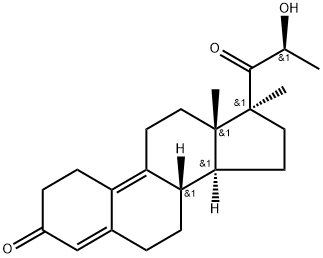A new potent and selective progestin: trimegestone
Trimegestone, sold under the brand names Ondeva and Totelle among others, is a progestin medication which is used in menopausal hormone therapy and in the prevention of postmenopausal osteoporosis. It was also under development for use in birth control pills to prevent pregnancy, but ultimately was not marketed for this purpose. The medication is available alone or in combination with an estrogen.
Preclinical biology
Trimegestone (TMG) is a 19-norpregnane progestin being developed, in combination with an estrogen, for the treatment of postmenopausal symptoms. TMG binds to the human progesterone receptor with an affinity greater than medroxyprogesterone acetate (MPA), norethindrone (NET), and levonorgestrel (LNG). In contrast, TMG binds with low affinity to the androgen, glucocorticoid and mineralocorticoid receptor and has no measurable affinity for the estrogen receptor. Compared to other progestins, TMG demonstrates an improved separation of its PR affinity from its affinity to other classical steroid hormone receptors.
In vivo, TMG has potent progestin activity. For example, TMG produces glandular differentiation of the uterine endometrium in rabbits and is about 30 and 60 times more potent than MPA and NET, respectively. In the rat, TMG maintains pregnancy, induces deciduoma formation, inhibits ovulation and has uterine anti-estrogenic activity. With respect to these endpoints, TMG appears to be more potent and selective on uterine epithelial responses than other classical progestin responses.
In vivo, TMG does not have significant androgenic, glucocorticoid, anti-glucocorticoid or mineralocorticoid activity but does have anti-mineralocorticoid activity and modest anti-androgenic effects. This overall profile is qualitatively similar to progesterone. When TMG is administered chronically, it antagonizes the effect of estradiol on the uterus but does not antagonize the beneficial bone sparing activity of estradiol.
Side effects
Side effects of trimegestone include headache, breast tenderness, nervousness, abdominal pain, bloating, muscle cramps, nausea, depression, and vaginal bleeding among others. Trimegestone is a progestin, or a synthetic progestogen, and hence is an agonist of the progesterone receptor, the biological target of progestogens like progesterone. It has weak antiandrogenic and antimineralocorticoid activity and no other important hormonal activity.
Conclusion
In rat studies evaluating CNS GABAA receptor modulatory activity, TMG is less active on this likely undesirable endpoint than progesterone and norethindrone acetate, which may translate into fewer mood-related side effects. The results indicate that TMG is a potent and selective progestin with a preclinical profile well suited for hormone replacement therapy.
See also
Lastest Price from Trimegestone manufacturers

US $1.10/g2025-04-17
- CAS:
- 74513-62-5
- Min. Order:
- 1g
- Purity:
- 99.0% min
- Supply Ability:
- 100 tons min
